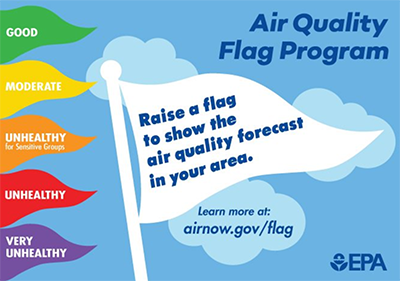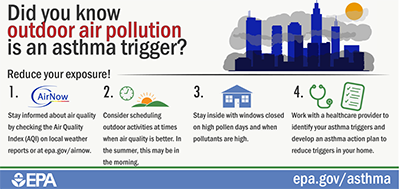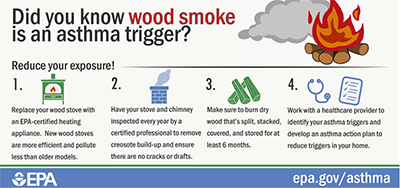May 3: Asthma & Your Health
Did you know that today is World Asthma Day? And it’s a great day to feature asthma education during Air Quality Awareness Week. May is also Asthma Awareness Month — a time to educate friends, family, and patients about asthma and promote awareness about how Being Air Aware and Prepared can help control this serious, sometimes life-threatening, chronic respiratory disease.
What is Asthma?
Asthma is a long-term disease that inflames and narrows your lungs’ airways. Have you ever tried to breathe through a flat straw? It makes breathing harder and can be scary. That’s how people who have asthma can feel when they are exposed to pollutants like dirty air, whether it’s from ozone, wildfire smoke or other pollution. We can all be prepared by checking the local air quality forecast at www.airnow.gov.
If you have asthma, or know someone who does, learn more about asthma:
- Manage asthma triggers
- Download infographics about asthma triggers
- Visit EPA's asthma website.
- Why is Coco Red? Picture Book
Avoid Air Pollution Triggers
People with asthma and other lung diseases usually know when they’re having a reaction, but what can you do to avoid it?
- First, know what your local Air Quality Index (AQI) forecast is for the day. If the AQI forecast is in the unhealthy categories, you can take appropriate measures and have your asthma action plan ready.
- Check your AQI before you go outside to know what steps to take. Reducing time being active outside, reducing your activity level, or even changing the time of day that you are outside can protect your lungs from air pollution. Learn how to use the AQI to reduce your exposure to air pollution.
- If there is smoke in the air, check the Fire and Smoke Map for the latest information about the AQI in your area. Wildfire smoke can make the outdoor air unhealthy to breathe. Smoke from outdoors can also enter your home and make it unhealthy to breathe indoor air. EPA has developed materials on how to reduce or remove polluted air inside of homes and buildings.
Learn how you can do to keep your indoor air quality cleaner during smoke events at https://www.epa.gov/indoor-air-quality-iaq/wildfires-and-indoor-air-quality-iaq.
Find more factsheets about protecting your health during wildfires at https://www.airnow.gov/wildfire-guide-factsheets/.Air Quality Flag Program
Join the Air Quality Flag Program to share the air quality forecast with your community. By raising a flag that corresponds with the AQI, your organization can play a huge role in helping people be more air aware and prepared!
to share the air quality forecast with your community. By raising a flag that corresponds with the AQI, your organization can play a huge role in helping people be more air aware and prepared!
Use the accompanying outreach materials and resources to let people know how to take action when the air is polluted.









